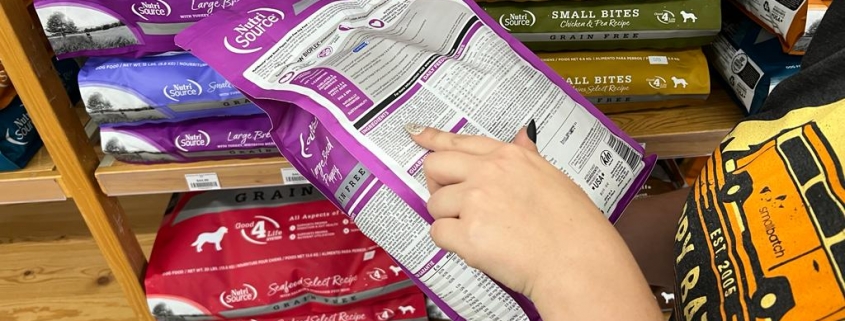Redefining Transparency: a dirty word
Transparency rarely exists in the pet industry. Despite what marketing tells us. So how do we fix it?
There are a lot of products and companies that make health claims and clean sourcing that aim to provide a certain level of comfort to the consumer. However, most companies are not willing or able to prove it. Simple email requests for documentation of processes and testing from me, as a retailer, often go unanswered. The lack of response is sometimes from companies most pet owners know and trust. Believe it or not, some of these companies would surprise even the savviest pet owner.
So how did we get here?
There’s a widespread lack of data across food, supplement, and treat categories. For example, a lack of data exists to substantiate claims such as ancient grains prevent the risk of DCM (dilated cardiomyopathy or heart disease). Or that adding taurine to a product makes it heart-healthy. What about high-protein pet foods? There’s no benchmark to define what that means – or that it’s beneficial. Why? Because nobody has held these companies accountable for their claims. They’ve never needed to provide data to support these claims because nobody has ever really asked. One can make the argument that the lack of data from manufacturers opened the doors up for bad science behind the grain-free and heart disease debate to flourish. Simply, bad science won because there was inadequate data to support the effectiveness of grain-free food to provide adequate nutrition. Manufacturers were and still are silent because they are unable to stand behind their products and support the retailers who sell their products. Harsh, but true.
These are just some recent examples. Many products within the industry, including ones perceived as natural and high quality, lack actual measurable transparency and quality control. This means that their benefits, or claim of benefit, could easily be overshadowed by poor sourcing, toxins, and/or formulation.
What is measurable transparency?
For supplements, few companies do inbound testing on their raw ingredients or at least make those results public. Such testing would verify that the ingredient is what it says it is. It should also screen for toxic contaminants and ensure each ingredient has verification of origin and quality supply chain. In today’s pandemic economy, a company should be able to claim AND certify ingredients within their supplements or products that are not sourced from China. That final product should also have an analysis that confirms the targeted levels of active ingredients and reconfirms the lack of toxins.
When it comes to toxic screening, CBD is of particular concern, because it can be a highly toxic plant. This is because hemp performs a process called phytoremediation. Meaning that it absorbs heavy metals and many of the agricultural chemicals in the soil such as pesticides, herbicides, and fertilizers. Inbound raw ingredients should always be tested for these toxins – in addition to the final product. CBD and other supplement companies should openly provide this information – however the majority can’t because they do not conduct these tests.
For treats – the same applies. Do the inbound raw ingredients have quality control measures that allow the company to be fully transparent? Will that company shares those reports? These same transparency concerns also apply to pet food. We also see a general lack of transparency and accountability leaving both manufacturers and retailers open for potential problems. Establishing accountability simply starts with both pet owners and retailers asking these questions and demanding improvement. Change won’t happen overnight, but improvement has to start somewhere.
How do we redefine transparency?
It’s clear how transparency across nearly all pet categories is lacking. Transparency has become a feel-good word for those who don’t know any better. However, for those that do, it’s become a cringe-worthy tagline that is an Achilles heel.
The reality is that asking these questions and holding companies accountable is a path that most are hesitant to venture down. However, gone are the days of blind trust in manufacturers. Blind trust has cost the health and lives of many pets too many times to count. The definition of insanity is doing the same thing over and over again and expecting a different result. As pet owners and advocates, we need to start asking the tough questions to demand accountability for the betterment of the industry, and most importantly our pets.
Asking the tough questions:
The following is a general, but not complete, list of questions to ask for food, supplement, and treat manufacturers. Keep in mind that most companies will be unable to provide all the answers and that the goal is to encourage actual, rather than perceived, transparency. It will take time, but change will require asking these questions and ultimately basing buying and retail stocking decisions on the availability and willingness to provide satisfactory answers.
- Do you have verification of your supply chain and the origin of your ingredients?
- Do any of your raw materials come from China?
- Do you conduct inbound testing for active ingredients, pathogens and toxins for your raw materials?
- Do you conduct a 3rd party analysis of the active ingredients/nutrients contained within the final product?
- Do you conduct digestibility tests on all your final products? Just select formulas? Or none at all? Are those reports public?
- What is the digestibility of your final product?
- Do you conduct testing for pathogens and toxins for your final product? Do you hold those products from release until testing results reveal it is safe to do so?






